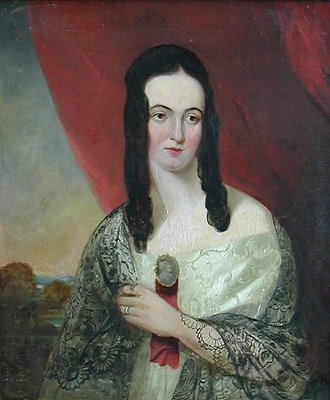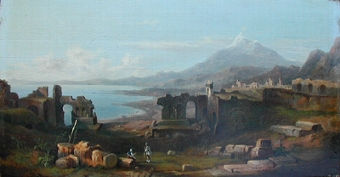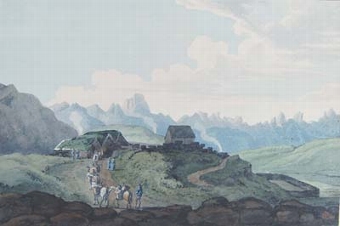John Dryden (9 August 1631 ? 1 May 1700) nicknamed Town-Bayes was an influential English poet, literary critic, translator, and playwright who dominated the literary life of Restoration England to such a point that the period came to be known in literary circles as the Age of Dryden. Walter Scott named him "Glorious John." He was made Poet Laureate in 1667.
Dryden was born in the village rectory of Aldwincle near Thrapston in Northamptonshire, where his maternal grandfather was Rector of All Saints. He was the eldest of fourteen children born to Erasmus Dryden and wife Mary Pickering, paternal grandson of Sir Erasmus Dryden, 1st Baronet (1553?1632) and wife Frances Wilkes, Puritan landowning gentry who supported the Puritan cause and Parliament. He was also a second cousin once removed of Jonathan Swift. As a boy Dryden lived in the nearby village of Titchmarsh, Northamptonshire where it is also likely that he received his first education. In 1644 he was sent to Westminster School as a King?s Scholar where his headmaster was Dr Richard Busby, a charismatic teacher and severe disciplinarian. Having recently been re-founded by Elizabeth I, Westminster during this period embraced a very different religious and political spirit encouraging royalism and high Anglicanism. Whatever Dryden?s response to this was, he clearly respected the Headmaster and would later send two of his own sons to school at Westminster. Many years after his death a house at Westminster was founded in his name.
As a humanist grammar school, Westminster maintained a curriculum which trained pupils in the art of rhetoric and the presentation of arguments for both sides of a given issue. This is a skill which would remain with Dryden and influence his later writing and thinking, as much of it displays these dialectical patterns. The Westminster curriculum also included weekly translation assignments which developed Dryden?s capacity for assimilation. This was also to be exhibited in his later works. His years at Westminster were not uneventful, and his first published poem, an elegy with a strong royalist feel on the death of his schoolmate Henry, Lord Hastings from smallpox, alludes to the execution of King Charles I, which took place on 30 January 1649.
In 1650 Dryden went up to Trinity College, Cambridge. Here he would have experienced a return to the religious and political ethos of his childhood: the Master of Trinity was a Puritan preacher by the name of Thomas Hill who had been a rector in Dryden?s home village. Though there is little specific information on Dryden?s undergraduate years, he would most certainly have followed the standard curriculum of classics, rhetoric, and mathematics. In 1654 he obtained his BA, graduating top of the list for Trinity that year. In June of the same year Dryden?s father died, leaving him some land which generated a little income, but not enough to live on.
Arriving in London during The Protectorate, Dryden procured work with Cromwell?s Secretary of State, John Thurloe. This appointment may have been the result of influence exercised on his behalf by the Lord Chamberlain, Sir Gilbert Pickering, Dryden?s cousin. Dryden was present at Cromwell?s funeral on 23 November 1658 where he processed with the Puritan poets John Milton and Andrew Marvell. Shortly thereafter he published his first important poem, Heroique Stanzas (1658), a eulogy on Cromwell?s death which is cautious and prudent in its emotional display. In 1660 Dryden celebrated the Restoration of the monarchy and the return of Charles II with Astraea Redux, an authentic royalist panegyric. In this work the interregnum is illustrated as a time of anarchy, and Charles is seen as the restorer of peace and order.
[edit]Later life and career
After the Restoration, Dryden quickly established himself as the leading poet and literary critic of his day and he transferred his allegiances to the new government. Along with Astraea Redux, Dryden welcomed the new regime with two more panegyrics; To His Sacred Majesty: A Panegyric on his Coronation (1662), and To My Lord Chancellor (1662). These poems suggest that Dryden was looking to court a possible patron, but he was to instead make a living in writing for publishers, not for the aristocracy, and thus ultimately for the reading public. These, and his other nondramatic poems, are occasional?that is, they celebrate public events. Thus they are written for the nation rather than the self, and the Poet Laureate (as he would later become) is obliged to write a certain number of these per annum.[7] In November 1662 Dryden was proposed for membership in the Royal Society, and he was elected an early fellow. However, Dryden was inactive in Society affairs and in 1666 was expelled for non-payment of his dues.
On 1 December 1663 Dryden married the royalist sister of Sir Robert Howard?Lady Elizabeth. Dryden?s works occasionally contain outbursts against the married state but also celebrations of the same. Thus, little is known of the intimate side of his marriage. Lady Elizabeth however, was to bear him three sons and outlive him. With the reopening of the theatres after the Puritan ban, Dryden busied himself with the composition of plays. His first play, The Wild Gallant appeared in 1663 and was not successful, but he was to have more success, and from 1668 on he was contracted to produce three plays a year for the King''s Company in which he was also to become a shareholder. During the 1660s and 70s theatrical writing was to be his main source of income. He led the way in Restoration comedy, his best known work being Marriage ? la Mode (1672), as well as heroic tragedy and regular tragedy, in which his greatest success was All for Love (1678). Dryden was never satisfied with his theatrical writings and frequently suggested that his talents were wasted on unworthy audiences. He thus was making a bid for poetic fame off-stage. In 1667, around the same time his dramatic career began, he published Annus Mirabilis, a lengthy historical poem which described the events of 1666; the English defeat of the Dutch naval fleet and the Great Fire of London. It was a modern epic in pentameter quatrains that established him as the preeminent poet of his generation, and was crucial in his attaining the posts of Poet Laureate (1668) and historiographer royal (1670).
When the Great Plague of London closed the theatres in 1665 Dryden retreated to Wiltshire where he wrote Of Dramatick Poesie (1668), arguably the best of his unsystematic prefaces and essays. Dryden constantly defended his own literary practice, and Of Dramatick Poesie, the longest of his critical works, takes the form of a dialogue in which four characters?each based on a prominent contemporary, with Dryden himself as ?Neander??debate the merits of classical, French and English drama. The greater part of his critical works introduce problems which he is eager to discuss, and show the work of a writer of independent mind who feels strongly about his own ideas, ideas which demonstrate the incredible breadth of his reading. He felt strongly about the relation of the poet to tradition and the creative process, and his best heroic play Aureng-zebe (1675) has a prologue which denounces the use of rhyme in serious drama. His play All for Love (1678) was written in blank verse, and was to immediately follow Aureng-Zebe. In 1679 he was attacked in an alley near his home in Covent Garden by thugs hired by John Wilmot, 2nd Earl of Rochester,[8] with whom he had a long-standing conflict.
Dryden''s greatest achievements were in satiric verse: the mock-heroic MacFlecknoe, a more personal product of his Laureate years, was a lampoon circulated in manuscript and an attack on the playwright Thomas Shadwell. Dryden''s main goal in the work is to "satirize Shadwell, ostensibly for his offenses against literature but more immediately we may suppose for his habitual badgering of him on the stage and in print." It is not a belittling form of satire, but rather one which makes his object great in ways which are unexpected, transferring the ridiculous into poetry. This line of satire continued with Absalom and Achitophel (1681) and The Medal (1682). His other major works from this period are the religious poems Religio Laici (1682), written from the position of a member of the Church of England; his 1683 edition of Plutarch''s Lives Translated From the Greek by Several Hands in which he introduced the word biography to English readers; and The Hind and the Panther, (1687) which celebrates his conversion to Roman Catholicism.
When in 1688 James was deposed, Dryden?s refusal to take the oaths of allegiance to the new government left him out of favour at court. Thomas Shadwell succeeded him as Poet Laureate, and he was forced to give up his public offices and live by the proceeds of his pen. Dryden translated works by Horace, Juvenal, Ovid, Lucretius, and Theocritus, a task which he found far more satisfying than writing for the stage. In 1694 he began work on what would be his most ambitious and defining work as translator, The Works of Virgil (1697), which was published by subscription. The publication of the translation of Virgil was a national event and brought Dryden the sum of ?1,400. His final translations appeared in the volume Fables Ancient and Modern (1700), a series of episodes from Homer, Ovid, and Boccaccio, as well as modernized adaptations from Geoffrey Chaucer interspersed with Dryden?s own poems. The Preface to Fables is considered to be both a major work of criticism and one of the finest essays in English.[citation needed] As a critic and translator he was essential in making accessible to the reading English public literary works in the classical languages. Dryden died on May 1, 1700, and was initially buried in St. Anne''s cemetery in Soho, before being exhumed and reburied in Westminster Abbey ten days later.[13] He was the subject of various poetic eulogies, such as Luctus Brittannici: or the Tears of the British Muses; for the Death of John Dryden, Esq. (London, 1700), and The Nine Muses.
Dryden was the dominant literary figure and influence of his age. He established the heroic couplet as a standard form of English poetry by writing successful satires, religious pieces, fables, epigrams, compliments, prologues, and plays with it; he also introduced the alexandrine and triplet into the form. In his poems, translations, and criticism, he established a poetic diction appropriate to the heroic couplet?Auden referred to him as "the master of the middle style"[14]?that was a model for his contemporaries and for much of the 18th century. The considerable loss felt by the English literary community at his death was evident from the elegies that it inspired.[15] Dryden''s heroic couplet became the dominant poetic form of the 18th century. The most influential poet of the 18th century, Alexander Pope,[citation needed] was heavily influenced by Dryden, and often borrowed from him; other writers were equally influenced by Dryden and Pope. Pope famously praised Dryden''s versification in his imitation of Horace''s Epistle II.i: "Dryden taught to join / The varying pause, the full resounding line, / The long majestic march, and energy divine." Samuel Johnson[16] summed up the general attitude with his remark that "the veneration with which his name is pronounced by every cultivator of English literature, is paid to him as he refined the language, improved the sentiments, and tuned the numbers of English poetry." His poems were very widely read, and are often quoted, for instance, in Tom Jones and Johnson''s essays.
Johnson also noted, however, that "He is, therefore, with all his variety of excellence, not often pathetic; and had so little sensibility of the power of effusions purely natural, that he did not esteem them in others. Simplicity gave him no pleasure." The first half of the 18th century did not mind this too much, but in later generations, this was increasingly considered a fault.
One of the first attacks on Dryden''s reputation was by Wordsworth, who complained that Dryden''s descriptions of natural objects in his translations from Virgil were much inferior to the originals. However, several of Wordsworth?s contemporaries, such as George Crabbe, Lord Byron, and Walter Scott (who edited Dryden''s works), were still keen admirers of Dryden. Besides, Wordsworth did admire many of Dryden''s poems, and his famous "Intimations of Immortality" ode owes something stylistically to Dryden''s "Alexander''s Feast". John Keats admired the "Fables," and imitated them in his poem Lamia. Later 19th century writers had little use for verse satire, Pope, or Dryden; Matthew Arnold famously dismissed them as "classics of our prose." He did have a committed admirer in George Saintsbury, and was a prominent figure in quotation books such as Bartlett''s, but the next major poet to take an interest in Dryden was T. S. Eliot, who wrote that he was ''the ancestor of nearly all that is best in the poetry of the eighteenth century'', and that ''we cannot fully enjoy or rightly estimate a hundred years of English poetry unless we fully enjoy Dryden.'' However, in the same essay, Eliot accused Dryden of having a "commonplace mind." Critical interest in Dryden has increased recently, but, as a relatively straightforward writer (William Empson, another modern admirer of Dryden, compared his "flat" use of language with Donne''s interest in the "echoes and recesses of words" his work has not occasioned as much interest as Andrew Marvell''s or John Donne''s or Pope''s.
Dryden is also believed to be the first person to posit that English sentences should not end in prepositions because it was against the rules of Latin grammar. Dryden created the prescription against preposition stranding in 1672 when he objected to Ben Jonson''s 1611 phrase the bodies that those souls were frightened from, although he didn''t provide an explanation of the rationale that gave rise to his preference.
What Dryden achieved in his poetry was not the emotional excitement we find in the Romantic poets of the early nineteenth century, nor the intellectual complexities of the metaphysical poets. His subject-matter was often factual, and he aimed at expressing his thoughts in the most precise and concentrated way possible. Although he uses formal poetic structures such as heroic stanzas and heroic couplets, he tried to achieve the rhythms of speech. However, he knew that different subjects need different kinds of verse, and in his preface to Religio Laici he wrote: ?...the expressions of a poem designed purely for instruction ought to be plain and natural, yet majestic...The florid, elevated and figurative way is for the passions; for (these) are begotten in the soul by showing the objects out of their true proportion....A man is to be cheated into passion, but to be reasoned into truth.?
Antiques.co.uk Ref: NV4CBN4F
- Materials:
- Oil on Panel
- Width (cm):
- 10 x 9 in. ( 26 x 23 cm.)
![Portrait of Frances Anne Agar, Circa 1779- circa 1840]() £3000.00
£3000.00![Portrait of General Charles Andr? Joseph Marie de Gaulle (1890-1970)]() £7500.00
£7500.00![A View of the Greek Theatre at Taormina, Sicilly with Mt Etna]() £2500.00
£2500.00![Travellers at Knisuvik and Sulphur Mountains beyond , Iceland]() £450.00
£450.00













